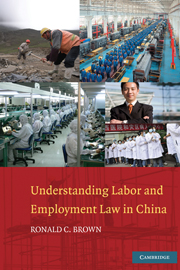Book contents
- Frontmatter
- Contents
- Preface
- Acknowledgments
- Understanding Labor and Employment Law in China
- PART I UNDERSTANDING CHINA'S REGULATION OF THE WORKPLACE
- PART II EMPLOYMENT RELATIONSHIPS
- 3 Employment Relationships
- 4 Individual Labor Contracts: Formation and Content
- 5 Collective Labor Contracts and Collective Negotiations
- PART III HIRING AND EMPLOYMENT PRACTICES
- PART IV WORKING CONDITIONS, WAGES, AND HOURS
- PART V EMPLOYEE BENEFITS: LEAVES, MEDICAL, MATERNITY, WORK-RELATED, UNEMPLOYMENT, AND PENSION INSURANCE
- PART VI DISCIPLINE AND TERMINATION UNDER EMPLOYMENT AGREEMENTS
- PART VII RIGHTS, REMEDIES, AND MULTIPLE FORUMS
- Appendix
- Index
- References
4 - Individual Labor Contracts: Formation and Content
Published online by Cambridge University Press: 22 January 2010
- Frontmatter
- Contents
- Preface
- Acknowledgments
- Understanding Labor and Employment Law in China
- PART I UNDERSTANDING CHINA'S REGULATION OF THE WORKPLACE
- PART II EMPLOYMENT RELATIONSHIPS
- 3 Employment Relationships
- 4 Individual Labor Contracts: Formation and Content
- 5 Collective Labor Contracts and Collective Negotiations
- PART III HIRING AND EMPLOYMENT PRACTICES
- PART IV WORKING CONDITIONS, WAGES, AND HOURS
- PART V EMPLOYEE BENEFITS: LEAVES, MEDICAL, MATERNITY, WORK-RELATED, UNEMPLOYMENT, AND PENSION INSURANCE
- PART VI DISCIPLINE AND TERMINATION UNDER EMPLOYMENT AGREEMENTS
- PART VII RIGHTS, REMEDIES, AND MULTIPLE FORUMS
- Appendix
- Index
- References
Summary
The passage of the Labor Contract Law (LCL) in 2007 was preceded by much public comment and hue and cry from foreign employers. Although some employers argued that the law would increase costs, others countered, saying that the law was aimed only at preventing illegal conduct. Before the law took effect on January 1, 2008, some employers tried to avoid its effects by prompting the resignations of employees and then rehiring many of the same employees, thereby avoiding the new law's grant of “open-ended” labor contracts for employees working for an employer for a consecutive period of not fewer than ten years. The Huawei Technologies of Shenzhen offered redundancy packages of $134 million to its employees, 7,000 of whom resigned but were subsequently rehired so as to “restart” the counting of their years of service. However, because of the public outcry and pressure from the press and the ACFTU, Huawei suspended its program. This “loophole” arguably was inapplicable, as many of the employees reportedly never lost a day of work, resigning one day and working the next under a new contract. Employees seem to be embracing the rights provided in the Labor Contract Law, as there are reports of sharp increases in labor dispute cases. The number of labor disputes heard by the courts in 2008 rose 94 percent in 2007, with the number nearly tripling in some coastal cities.
- Type
- Chapter
- Information
- Understanding Labor and Employment Law in China , pp. 36 - 43Publisher: Cambridge University PressPrint publication year: 2009



